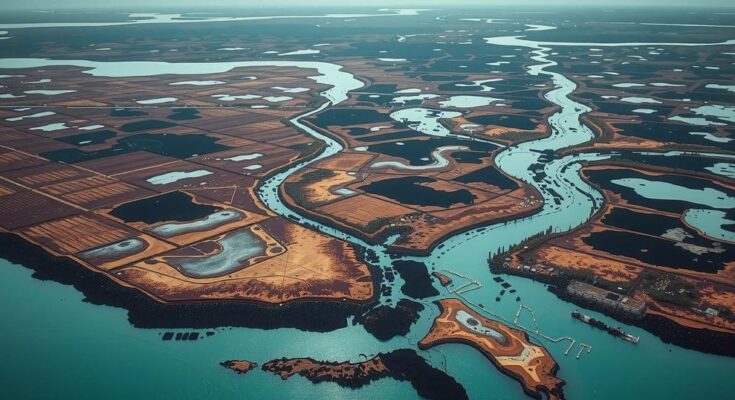Ecopetrol, Colombia’s leading oil company, has been implicated in extensive pollution across numerous sites, releasing significant negative impacts on local ecosystems. Data from a whistleblower indicates that many pollution incidents were underreported or hidden from authorities. While Ecopetrol maintains it is compliant with regulations, concerns persist regarding ongoing spills and threats faced by local advocates. The situation raises critical questions about environmental and social governance within the energy sector.
Ecopetrol, Colombia’s largest oil company, has been linked to extensive pollution across more than 800 sites between 1989 and 2018, including vital water sources and biodiverse wetlands. A whistleblower revealed that approximately 20% of these incidents went unreported, highlighting the ongoing issue of oil spills that compromise the environment and local communities. Although Ecopetrol claims compliance with Colombian law and maintains that its sustainability practices are industry-leading, concerns raised by residents and environmental advocates suggest otherwise.
The company’s main refinery in Barrancabermeja is situated along the Magdalena River, a source of water for millions. Local fishing communities report that oil pollution is harming wildlife and ecosystems. Observations during the BBC’s visit last June revealed distressing conditions, such as fish emitting the smell of crude oil and oily films covering the water’s surface, indicating severe contamination. Community leader Yuly Velásquez noted, “This is all grease and waste that comes directly from the Ecopetrol refinery.”
Andrés Olarte, who worked at Ecopetrol from 2017 to 2019, disclosed alarming pollution data that he believed the company attempted to conceal from authorities. He identified more than 839 cases of “unresolved environmental impacts” where oil contamination was not addressed, with some locations remaining polluted for over a decade. He alleges that a fifth of these records were intentionally hidden, indicating an effort to keep the extent of pollution from regulators.
Ecopetrol’s former CEO, Felipe Bayón, firmly denied any policy regarding withholding information about ecological damages, attributing many spills to sabotage by criminal groups. However, reports indicate that only 6% of the pollution incidents ascribed to sabotage were categorized as such. Recent figures suggest that the company has continued to be responsible for ongoing pollution, with hundreds of spills reported since 2020.
Local advocates report a dramatic decline in wildlife, witnessing numerous deaths of endangered species such as manatees and turtles. These tragic circumstances illustrate the detrimental effects of pollution on biodiversity and local livelihoods. Despite threats faced by whistleblowers and advocates regarding the environmental situation, both Olarte and Velásquez emphasize their commitment to taking action against Ecopetrol’s pollution despite the risks involved.
Olarte, now living in Germany, continues to seek accountability from Ecopetrol, but his efforts have not yet yielded satisfactory outcomes. He stated his motivation to advocate for his community, expressing a deep concern for the environmental and social implications of Ecopetrol’s operations. Ecopetrol underscores its importance to Colombia’s energy landscape, claiming over 1.5 million families rely on its services, stating a need for balanced energy production while preserving ecological integrity.
The investigation into Ecopetrol reveals significant challenges regarding pollution management and reporting, raising serious environmental and human rights concerns. Despite the company’s assertions of compliance and responsible practices, the evidence suggests a troubling history of pollution that risks biodiversity, local fauna, and the livelihoods of communities dependent on the Magdalena River. Whistleblowers and local advocates face grave dangers in their quest for accountability while underscoring the pressing need for transparency and environmental protection within the oil industry.
Original Source: www.bbc.com




